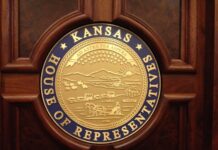It all started in Berkeley.
Saying it was facing a climate emergency, the city in California became the first in the nation to ban the installation of natural gas lines in new homes as part of the battle against climate change and fossil fuel emissions.
It wasn’t the first time the Bay Area city passed progressive environmental legislation that started a trend, becoming the first in the country in 1977 to limit smoking in bars and restaurants.
Now, there are believed to 41 cities across California that have prohibited or discouraged gas hookups for new construction, according to a Sierra Club list.
Last month, Oakland imposed a ban on natural gas for new apartment and commercial buildings. The same day, San Jose expanded a ban on natural gas.
Fearing that California has started a trend that might play out more extensively nationwide, a bill has been introduced in the Kansas Legislature to stop local governments from limiting energy choices for consumers.
The bill, backed by Kansas Gas Service, bars locals governments from restricting public access to natural gas.
The bill prohibits local governments from discriminating against any type of energy, but the focus is on natural gas because of what is happening nationally.
“Recently, there has been a growing movement to eliminate the use of natural gas,” said Patrick Vogelsberg, government affairs manager for Kansas Gas Service.
“This pathway is shortsighted and will hinder a community’s ability to reduce emissions while removing a reliable, low-cost energy option from its citizens,” he said.
So far, Arizona, Tennessee, Oklahoma and Louisiana have all passed similar laws to what has been proposed in Kansas. Another four states have considered similar legislation.
No city in Kansas has banned natural gas, but there are concerns about a Lawrence city ordinance that calls for going to carbon-free energy sources by 2035.
The ordinance would apply to natural gas unless it’s produced by a carbon-free source.
Natural gas does not qualify as clean renewable energy because of its emissions and environmental impacts, city officials said.
That could change if natural gas utilities secure renewable sourcing like landfill methane, they said.
“The city of Lawrence feels that this legislation really limits our ability to meet the sustainability goals that we have for our community,” said Jasmin Moore, sustainability director for the city of Lawrence and Douglas County.
“It also limits and restricts local power, and anything that restricts the ability of cities to make decisions about how to govern ourselves is something that we are not in support of,” Moore said.
The utility companies don’t see it that way.
“Black Hills Energy believes all Kansans should be able to choose the energy source that’s right for their homes and businesses,” Black Hills Energy Kansas General Manager Jerry Watkins said in a statement.
“Whether it is a family struggling to make ends meet or a restaurant operating on narrow margins, this bill protects their decision to choose an energy source – like affordable natural gas – that’s right for their set of circumstances,” he said.
So far, the battle over natural gas and its role in climate change has unfolded in California, Washington, New York and Massachusetts.
In Seattle, Mayor Jenny Durkan is proposing restrictions on the use of natural gas or other fossil fuels for heating in new commercial buildings or apartments.
In Massachusetts, the Boston suburb of Brookline was believed to be the first city outside of California to ban natural gas.
However, the Democratic state attorney general said the ban violated statewide building and gas codes, as well as the Department of Public Utilities’ authority to regulate the sale and distribution of natural gas.
Vogelsberg said there’s concern that if cities start adopting their own energy policies, it would lead to a patchwork of laws governing utilities, which are already regulated by the Kansas Corporation Commission.
“What happens in one city can have an impact outside the city limits,” he said.
“We’re 100% regulated by the KCC, and that’s really where I think state energy policy should be established,” he said.
“We don’t want to see Kansas go down a patch where there’s a patchwork of local energy policies that would be harmful for their own citizens and businesses but then also for busineses that want to expand or relocate to the state,” he said.
The Sierra Club takes issue with the legislation, calling it “shortsighted” and “irresponsible” to preemptively interfere with local governments’ energy plans.
“Legislators should not be doing the bidding of for-profit, monopoly utilities to obstruct community-led, democratic efforts aimed at reducing household costs and actualizing real leadership to help our society and the environment,” said Zack Pistora, the Kansas Sierra Club’s legislative director.
“The Energy Choice Act doesn’t sound like it gives much choice to our local communities and their elected leaders who want to move past the negative costs of fossil fuels,” Pistora said, alluding to the name of the legislation.
The League of Kansas Municipalities also has some reservations about the bill.
“We always have concerns when there are attempts to remove decision-making from people elected by their neighbors,” said Trey Cocking, deputy director of the League of Kansas Municipalities.
Kansas has about 872,000 natural gas customers served mostly by three companies, Kansas Gas, Atmos Energy and Black Hills Energy.
Households use about 25% of the natural gas delivered to consumers in Kansas, and 6 out of 10 Kansas homes use natural gas as their primary energy source for heat.
Moving away from natural gas is not necessarily an easy solution for cities.
The bans in other states, for instance, have drawn opposition from Black and Latino leaders in California, who say they can be a form of regressive tax on low- and middle-income residents.
A study by the University of California at Los Angeles found that gas in Southern California was four to six times cheaper than electricity, and a transition away from natural gas would hurt less affluent communities.
The study didn’t oppose the bans, but it suggested that California lawmakers and regulators should provide financial incentives for low-income households to purchase electric appliances to replace gas-powered ones.
Researchers also suggested that incentives should be made available to help low-income households cover the costs of running the new appliances because the energy they use would be more expensive.
In Kansas, Democratic state Sen. Marci Francisco of Lawrence is leaning in favor of the legislation.
She’s working with the city of Lawrence to better understand concerns it has with the bill.
She questioned the value ordinances requiring customers to transition from natural gas that’s used for heat to electricity that in turn could be used for heating.
“I don’t know that we want to take natural gas, convert it to electricity and then convert it back to heat,” Francisco said. “That’s seems very inefficient.”
Francisco also said she thought it would be impossible to always know the source of how energy is being produced, noting that electricity originates from multiple sources.
“A municipality can’t determine how their electricity is produced,” she said.















